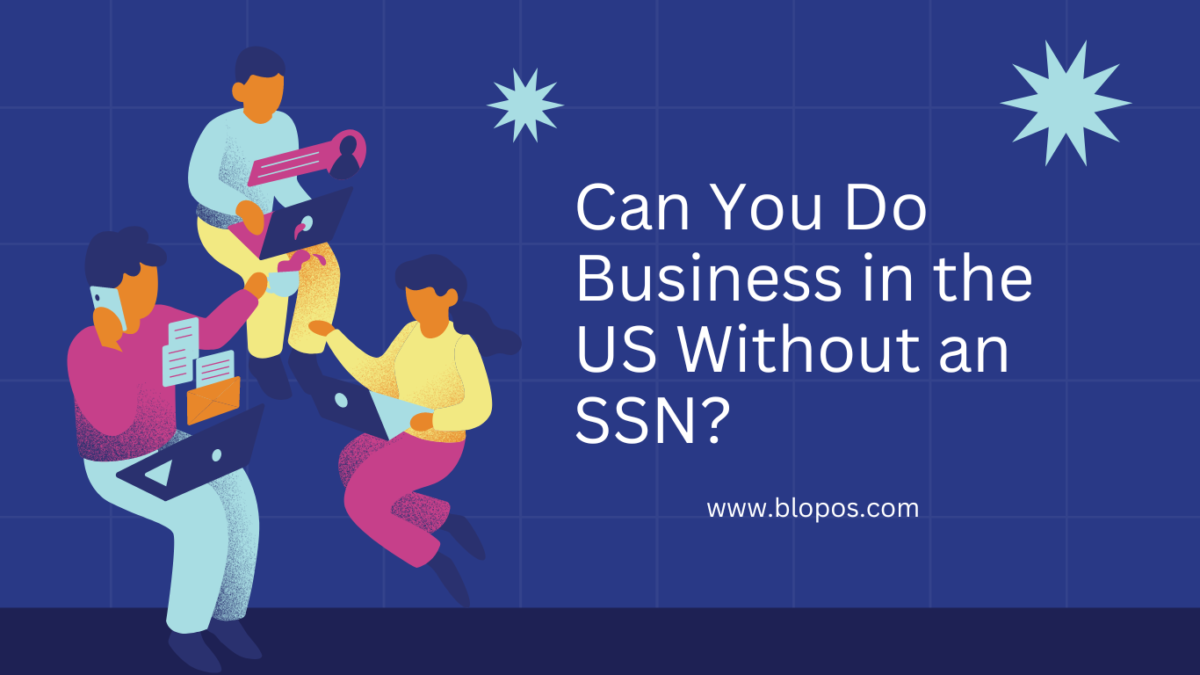How to Start a Business in the US Without an SSN.
Many domestic and international entrepreneurs dream of starting a business in the United States. However, navigating the legal and administrative requirements can be challenging, especially when understanding the role of the Social Security Number (SSN). This article will explore whether you can do business in the US without an SSN, what an SSN is, and alternative options available for non-citizens and non-residents.
Can You Do Business in the US Without an SSN?
What is an SSN?
A Social Security Number (SSN) is a nine-digit number issued by the Social Security Administration (SSA) to US citizens, permanent residents, and certain non-immigrant workers. It serves multiple purposes:
Identification
The SSN is a primary form of identification in the US. It is used in various contexts, from opening a bank account to applying for credit.
Tracking Income
The government uses the SSN to track an individual’s earnings and the taxes paid on those earnings. Employers report income to the IRS using the SSN, which is also used to calculate Social Security and Medicare benefits.
Accessing Government Services
An SSN is required to access certain government services and benefits, such as Social Security disability benefits and unemployment insurance.
Filing Taxes
The SSN is a taxpayer identification number (TIN) for individuals filing their tax returns with the Internal Revenue Service (IRS).
Can You Start a Business in the US Without an SSN?
Yes, you can start a business in the US without an SSN, but the process involves some additional steps and alternative identification numbers. Here’s how:
Employer Identification Number (EIN)
The most common alternative to an SSN for business purposes is an Employer Identification Number (EIN). An EIN is a nine-digit number issued by the IRS to identify a business entity for tax purposes. It is sometimes called a Federal Tax Identification Number (FTIN).
Who Needs an EIN?
Suppose you are starting a business in the US. In that case, you will need an EIN if your company has employees, operates as a corporation or partnership, or files tax returns for employment, excise, or alcohol, tobacco, and firearms.
How to Apply for an EIN
Non-citizens and non-residents can apply for an EIN online through the IRS website. If you do not have an SSN or Individual Taxpayer Identification Number (ITIN), you can apply for an EIN by filling out IRS Form SS-4 and mailing or faxing it to the IRS. In this case, you can enter “Foreign” in the SSN/ITIN section of the form.
Individual Taxpayer Identification Number (ITIN)
An ITIN is another alternative for individuals not eligible for an SSN. The IRS issues the ITIN to non-citizens and non-residents who need to file a US tax return but do not qualify for an SSN.
Who Needs an ITIN?
Individuals who are not eligible for an SSN but are required to file taxes in the US, such as non-resident aliens with income in the US, foreign investors, or individuals claiming a tax treaty benefit, should apply for an ITIN.
How to Apply for an ITIN
To apply for an ITIN, complete IRS Form W-7 and submit it with your tax return. The IRS will then issue you an ITIN, which can be used for tax filing purposes but not for work authorization.
Forming a Business Entity Without an SSN
Suppose you are a non-citizen or non-resident without an SSN. In that case, you can still form a business entity in the US, such as an LLC (Limited Liability Company) or corporation. Here’s how:
LLC Formation
As mentioned above, you can form an LLC without an SSN by applying for an EIN. An LLC is a famous business structure that provides liability protection and flexibility in management and taxation.
Corporation Formation
You can form a corporation without an SSN by obtaining an EIN. A corporation is a more complex business structure typically used for larger businesses. It offers liability protection, the ability to raise capital, and perpetual existence.
Registered Agent Requirement
In most states, you must designate a registered agent—a person or company that receives legal documents for your business. The registered agent must have a physical address in the state where your business is registered.
Opening a Business Bank Account
Opening a business bank account is essential for managing your business finances. While many banks require an SSN to open an account, non-citizens and non-residents can use their EIN and ITIN as alternatives. It is advisable to check with the specific bank for their requirements, as they may vary.
Paying Taxes Without an SSN
As a business owner, you must pay taxes on your business income. You can use your EIN to file business taxes if you do not have an SSN. Additionally, if you have an ITIN, you can use it to file your tax return.
Obtaining Business Licenses and Permits
Depending on your business type and location, you may need to obtain various licenses and permits to operate legally. The requirements for licenses and permits vary by state and local jurisdiction. You can get these licenses without an SSN by using your EIN.
Challenges and Considerations
While it is possible to do business in the US without an SSN, there are some challenges and considerations to keep in mind:
Limited Access to Credit
With an SSN, obtaining business loans or credit may be more accessible, as most lenders require an SSN to check your credit history. However, some lenders may consider your business’s creditworthiness based on its financials and EIN.
State-Specific Requirements
Some states may have specific requirements or restrictions for non-citizens and non-residents starting a business. It’s essential to research the requirements in the state where you plan to operate.
Legal and Tax Advice
Navigating the legal and tax implications of business in the US without an SSN can be complex. It’s advisable to seek professional legal and tax advice to ensure compliance with all regulations.
Conclusion
In conclusion, business in the US without an SSN is entirely possible. By obtaining an EIN and, if necessary, an ITIN, non-citizens and non-residents can form business entities, open business bank accounts, and meet tax obligations. However, it’s essential to be aware of the challenges and to seek professional guidance to navigate the process successfully. Whether you are a foreign entrepreneur or a non-resident investor, the US offers many opportunities for those willing to navigate its legal and regulatory landscape.



